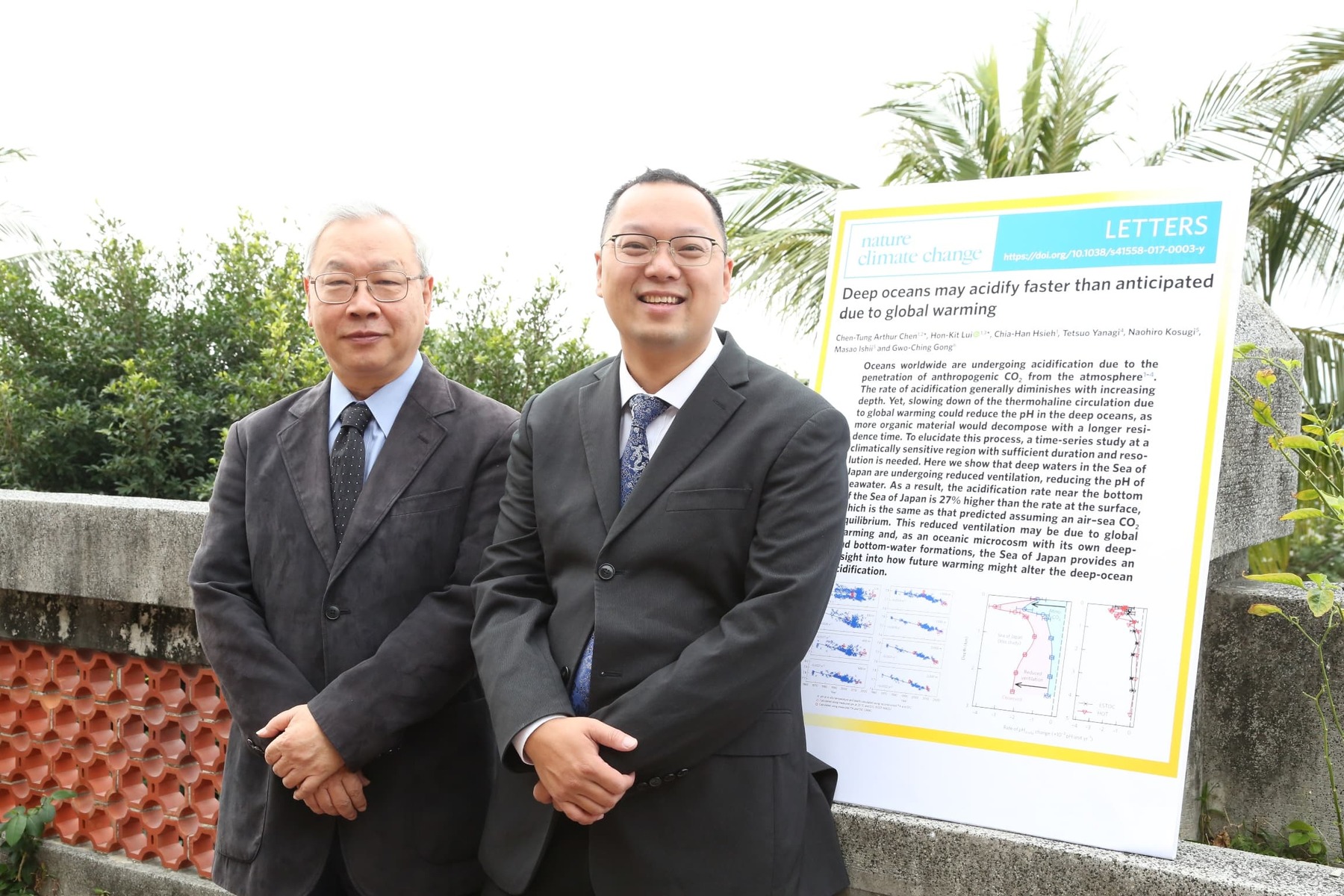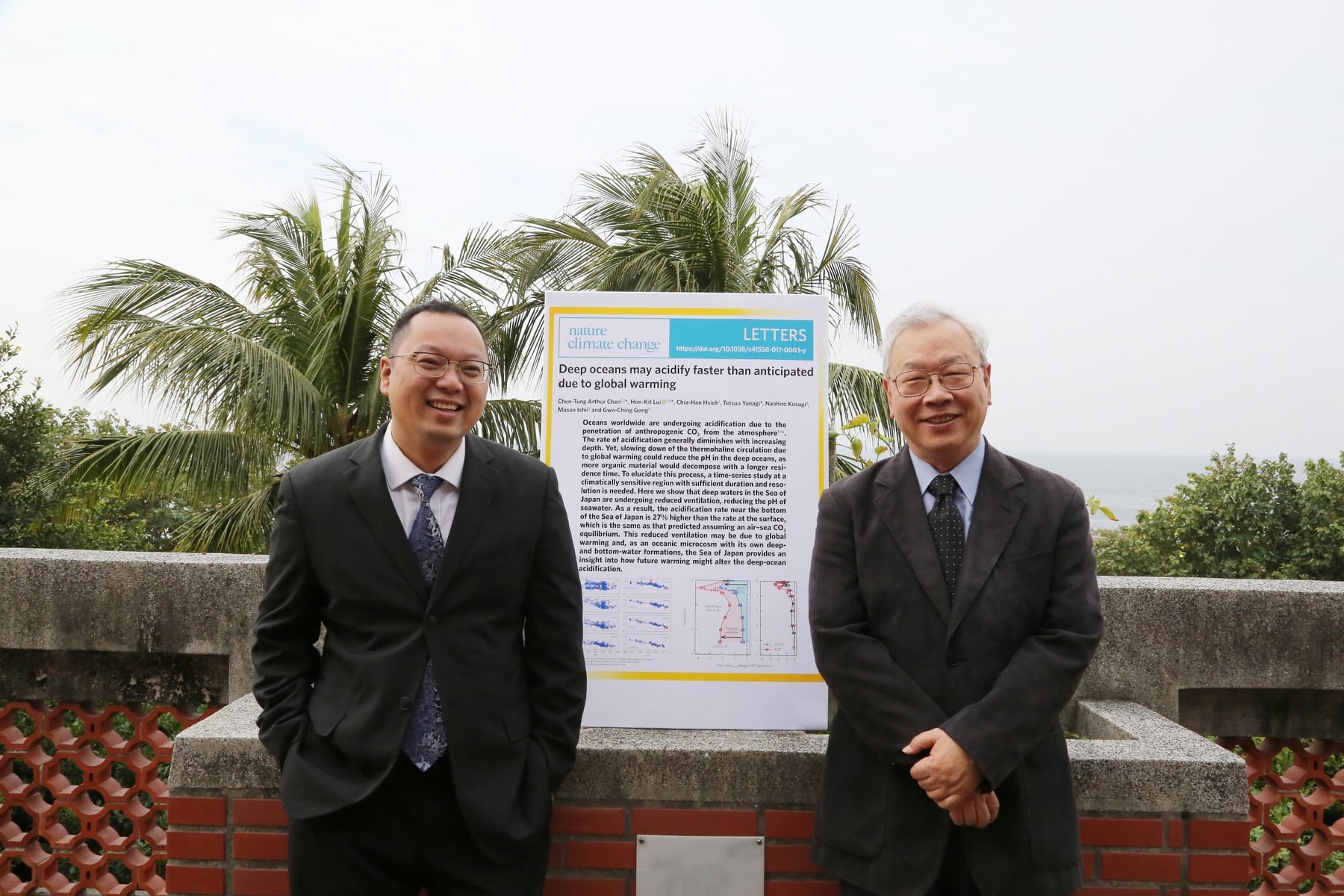Acidification of Deep Oceans: An International Study Lead by National Sun Yat-sen University Published


Chair Professor Chen-Tung Arthur Chen at the Department of Oceanography of National Sun Yat-sen University led a Taiwan–Japan collaborative research team and published a study on global climate change (“Deep oceans may acidify faster than anticipated due to global warming”) in the top international journal Nature Climate Change. In this study, the Sea of Japan served as an example to show that global warming may accelerate the acidification of deep oceans. According to the latest findings, some larvae were damaged to some degree by acidic seawater; they had difficulty in hearing approaching predators, and thus, had reduced chances of survival. Therefore, ocean acidification will affect marine ecology and fishery development.
Carbon dioxide emitted from the burning of fossil fuels is called manmade CO2, which is a type of greenhouse gas that can cause global warming. Carbon dioxide is a type of acid gas. Carbon dioxide continuously dissolving in seawater can cause ocean acidification, which affects the sustainable development of marine ecology. A research team member, Assistant Researcher Hon-Kit Lui from the Taiwan Ocean Research Institute at National Applied Research Laboratories indicated that currently, the surfaces of oceans acidify most rapidly; acidification rates decrease as water depth increases. At approximately 1000 meters under the open oceans, no apparent ocean acidification can be observed; however, the Sea of Japan is different. The research team reconstructed the pH value of seawater in the Sea of Japan over the past few decades and found that at 2500 meters under the sea, the acidification rate was nearly 30% higher than at the surface, indicating deep ocean acidification. The reason for the acidification was not manmade carbon dioxide, but carbon dioxide released from decomposing organic matter.
Professor Chen asserted that scientists bred clams in seawater at various acidity levels; smaller clams were found in seawater of higher acidity level and their shells appeared unhealthy. He further indicated that ocean acidification substantially negatively influences organisms. Calcium carbonate is the main element to form calcareous phytoplankton or bones (e.g., coral bones and shellfish shells). However, calcium carbonate cannot resist acidity. When seawater becomes acidic, these organisms will become unhealthy. Global warming has resulted in reduced density of surface seawater, thereby preventing surface water from sinking downward and slowing vertical convection. However, organic matter dropping from the surface seawater to deep seawater was decomposed by microorganisms, emitting CO2. Food left for a long time will become rotten, and similarly, when seawater stagnates for a long time, more CO2 will accumulate and the seawater will become acid. The Sea of Japan is a mini ocean that responds more quickly to climate change than a large ocean. Professor Chen reminded readers that the change in the Sea of Japan over the past few decades may occur in oceans worldwide in the future.
Hon-Kit Lui emphasized that in this study, the carbon chemistry parameters for seawater at various depths in the Sea of Japan over the past few decades were reconstructed. During the study, Professor Chen visited related units in Japan several times to understand the quality assurance and quality control of the data collected. The studies on the Sea of Japan previously published by Professor Chen were the key components for the reconstruction process. The carbon chemistry data analyzed by the Japan Meteorological Agency in recent years and the data collected from the Sea of Japan in 1992 by Professor Chen and Professor Gwo-Ching Gong at the Institute of Marine Environment and Ecology, National Taiwan Ocean University, have become crucial indicators for verifying reconstruction results.
Co-authors of this research paper also include Professor Chen’s Master graduate Chia-Han Hsieh, Professor Tetsuo Yanagi at the International Environmental Management of Enclosed Coastal Seas Center, Japan, Naohiro Kosugi and Masao Ishii, researchers at Japan Meteorological Agency, and Professor Gwo-Ching Gong.
The abstract for this study can be found at the following website: https://www.nature.com/articles/s41558-017-0003-y
